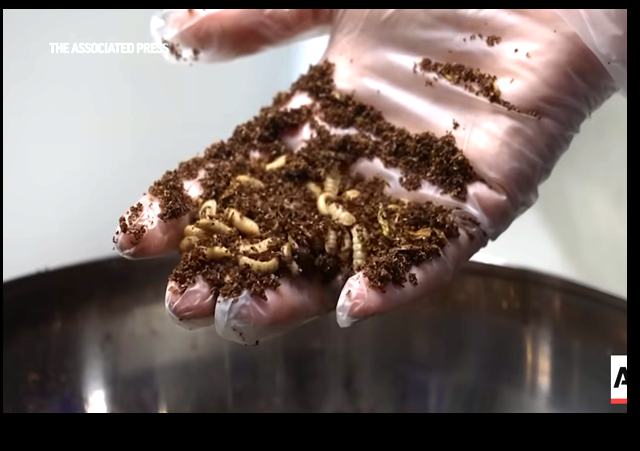“The black soldier fly protein market is projected to reach $3.96 billion by 2033”

Last year, it became very apparent that the United Nations, globalist bureaucrats, and climate cultists were going to push to replace traditional protein sources regular people enjoy with insects.
Edible insects are being promoted as a low-fat, high-protein food for people, pets and livestock. According to the U.N., they come with appetizing side benefits: Reducing greenhouse gas emissions and livestock pollution, creating jobs in developing countries and feeding the millions of hungry people in the world….Some insects may already be in your food (and this is no fly-in-my-soup joke). Demand for natural food coloring as opposed to artificial dyes is increasing, the agency’s experts say. A red coloring produced from the cochineal, a scaled insect often exported from Peru, already puts the hue in a trendy Italian aperitif and an internationally popular brand of strawberry yogurt. Many pharmaceutical companies also use colorings from insects in their pills
Last fall, I reported that Tyson Foods, a major U.S. producer of beef, pork, and chicken, is now making plans to develop products from protein that comes from insects. While the firm’s insect protein is currently planned for animal food, the trend toward human consumption appears evident.
Now comes news that an Israeli firm has just received millions of dollars to develop the product of black soldier fly larvae as a protein source, ostensibly for animal feed as well.
Israeli company FreezeM which specializes in breeding black silver flies has completed a $14.2 million Series A funding round to accelerate the deployment of its flagship product, PauseM.PauseM provides ready-to-use young larvae of the black soldier fly, which have been “paused” in their growth cycle for 14 days but can be reawakened. By using PauseM, factories can eliminate the need for the fly breeding stage, simplifying their operations. This approach separates the breeding stage from the growth and processing stages, leading to streamlined production, cost savings, and increased efficiency.This development is expected to lower the barrier to entry for new players in the insect protein market and facilitate the expansion of existing companies.The company said the black soldier fly protein market is projected to reach $3.96 billion by 2033, addressing global food scarcity and organic waste buildup…Specifically, the company said that approximately 2,500 units of PauseM, containing about 2.5 kg of young larvae, will convert 80-100 tons of organic waste into about five tons of high-quality protein and about two tons of oil for animal and pet feeding within 14 days, additionally yielding about 20 tons of organic compost for agriculture.
I am all for innovation and research when it comes to expanding food choice options for humans. Interestingly, a study from the Hebrew University of Jerusalem found that black soldier fly oil has anti-inflammatory powers and may alleviate inflammation in conditions like ulcerative colitis.
The team found that the oil from the larvae (BSFL) is abundant in beneficial medium-chain fatty acids that reduce inflammation. By comparing its effects with a specific fatty acid (C12:0), they revealed that BSFL oil uniquely countered inflammation triggered by different immune signals, creating cellular changes that could curb inflammation.AdvertisementThese findings suggest that the oil, rich in medium-chain fatty acids, holds much promise as an inflammation-regulating agent, offering new avenues for future research and interventions.
However, selling insect protein as a solution to the hysteria generated by climate cultists taints the entire business model. Take for example, the moralistic approach used by another black soldier fly protein development start-up, River Road Research near Buffalo, NY.
River Road Research’s proprietary biotechnology advances a circular economy by tackling two major challenges: food waste and the shrinking biodiversity of ocean life.Uneaten food makes up a waste stream weighing in at 40 million tons each year. Wasted food in a landfill generates methane, a greenhouse gas (GHG) that is 25 times as potent as carbon dioxide. Products like River Road’s protein meal offer economically viable routes for recovering the energy and resources that go into food production while avoiding GHG emissions.Aquaculture has been linked to habitat destruction and species loss across the oceans due to the use of conventional, fish-derived feed.
River Road pushes the generation of methane as bad, and a great deal of methane is generated by bovines. How convenient it also supplies a meat-alternative protein source that absolutely nobody wants as a replacement for their steak and hamburgers.
CLICK HERE FOR FULL VERSION OF THIS STORY